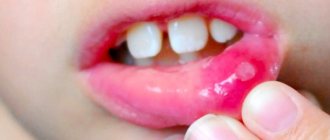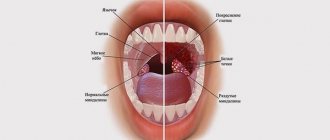Psychosomatics of oral diseases
Oral diseases are associated with problems in communication and social interaction. What difficulties become prerequisites for psychosomatic stomatitis in adults:
- being ignored by a partner;
- futile attempts to prove something;
- irritation;
- resentment;
- fatigue.
Fatigue, which inevitably arises after long arguments and conflicts, forces a person to retreat. And along with this, stomatitis often develops - inflammation of the oral mucosa, presented in the form of ulcers. This inflammation is necessary for a person to remain silent, restore the strength spent on the conflict, and finally give vent to the accumulated negativity (but in bodily form).
Sometimes stomatitis occurs in a different way: you have been nurturing some idea in your head for a long time, one might say, arguing with yourself, and then you decided to express it, but received condemnation. Thus, the psychosomatic cause of stomatitis may be unrealized personal potential, unspoken or rejected opinion.
The psychosomatics of stomatitis is similar to the principle of the development of nervous allergies. Depression, suppressed emotions, anxiety, fear and other stress factors turn on the body's defense systems. But what stomatitis will be like (there are 4 forms of rashes and 4 reasons for the development of the disease) depends on the characteristics of the immunity of a particular person. Ulcers occur due to anger and guilt.
It is important! The prerequisites for stomatitis are disputes, quarrels, scandals, conflicts, nervous breakdown, constant tension and an unfavorable psychological climate in relationships.
Are all diseases caused by nerves?
All diseases are caused by nerves - a phrase that is familiar to almost everyone.
The nervous system is involved in any emotional reaction, be it joy, anger or anxiety. The influence of psychological reactions on the formation and course of the disease is studied in such a direction as psychosomatics. The term consists of two words “psycho” - soul and “somatics” - body, bodily. According to this theory, the causes of diseases are hidden within the individual. In other words, bodily disorders arise due to problems and disharmony in his soul. The psycho-emotional state directly affects the state of health, for example, depression has a depressing effect on the immune system. Freud at one time provided the theory of the unconscious that is well known to everyone today. His model became decisive in the development of psychology and psychotherapy.
Causes of psychosomatic reactions:
- scandal/conflict;
- body language is a reflection of the state of the psyche;
- conditional benefit;
- heavy accumulated experience;
- suggestion;
- self-punishment;
- systematic use of phrases with double meanings.
Stress signals the body that problems may begin. Stressful situations reduce immunity and lead to the development of various diseases. During conflict and other unfavorable situations, increased amounts of adrenaline and cortisol are released into the blood, which undermine the functioning of protective functions. After the stressful situation goes away, the indicators return to normal, but the consequences make themselves felt after some time.
The most common diseases that arise due to stress are migraines, cardiovascular pathologies, diabetes, psoriasis, neurodermatitis, herpes, stomatitis, and gastrointestinal diseases. Signs of stress are: headache, pressure surges, rapid pulse, lethargy and fatigue, sleep disturbance, cyclothymia (mood changes).
Stomatitis as a body protest in children and adults
Stomatitis occurs more often in children, but adults can also encounter this problem. Stomatitis can be a form of protest in response to certain events (psychosomatic stomatitis):
- frequent conflicts;
- situations from which you see no way out;
- dirty and unpleasant situations;
- situations in which you had to scold someone, insult, or be sarcastic;
- aggression in response to offensive remarks addressed to us;
- misunderstanding in relationships with loved ones, suppression of your opinion, silencing in the literal and figurative sense;
- the desire to hold back unpleasant emotions and words;
- forced silence due to fear of losing some benefits.
Pay attention to the phrases with double meanings that we sometimes say: “I hate to say this,” “work has an unpleasant aftertaste,” “my tongue doesn’t dare say it.” We ourselves indicate to which the body responds with protest in the form of stomatitis. You just need to be more attentive to yourself.
The causes of illness in a child lie in the peculiarities of the psychological climate in the family. A tense environment, conflicts between parents and suppression of the child inevitably lead to oral diseases.
What else causes childhood stomatitis:
- change in usual living conditions: moving, changing school or kindergarten, parental divorce;
- change in daily routine and routine: lack of sleep or lack of games, visiting numerous clubs and sections;
- overprotection and coercion, upbringing in the “family idol” style;
- a ban on doing what you love (“I know better what you need”);
- misunderstanding and non-acceptance on the part of parents, busy parents;
- contradictory educational positions of parents, family and school;
- Conflicts in relationships with peers: they are not allowed to speak out, they criticize, insult, or do not listen.
In adults, stomatitis is more often caused by difficulties at work and in relationships with a loved one. The state of the oral cavity is affected by conflicts and contradictions.
Psychosomatics of bronchial asthma
Psychosomatic diseases are a group of painful conditions that appear as a result of the interaction of mental and physiological factors. They are mental disorders that manifest themselves at the physiological level, physiological disorders that manifest themselves at the mental level, or physiological pathologies that develop under the influence of psychogenic factors.
Emotional experiences and stress are favorable conditions for exacerbation of the disease. Despite the fact that bronchial asthma in most cases is inherited, it does not develop immediately after birth. The disease can make itself felt at any age, and the impetus for its progression is usually an unfavorable emotional background.
Emotional experiences contribute to the development of the disease more than physiological factors. Psychological overloads form an asthmatic condition.
Bronchial asthma is a disease that affects the respiratory system. It is with these organs that the psychosomatics of bronchial asthma is associated - breathing, the first breath of a newly born child, the cry of a baby calling for its mother. Thus, we can conclude that people suffering from asthma experience a lack of love and understanding from their loved ones.
The inability to give vent to one’s negative emotions is another psychosomatic cause of the disease. Asthmatics do not express aggression outward, so they are susceptible to depression; they have to suppress internal negativity, which manifests itself in bronchospasms and causes suffocation.
According to the observations of psychologists, people suffering from bronchial asthma may have similar psychological characteristics. Most of them prefer solitude and loneliness. And the more severe the disease, the more a person withdraws into himself. Asthmatics lack decisiveness and find it difficult to make a choice.
Patients with bronchial asthma are very sensitive and emotional, they are infantile and dependent on the opinions of others.
Elimination of psychosomatic causes.
To get rid of the disease or alleviate its course, it will be necessary to eliminate the psychosomatic causes that led to the development of asthma.
Good help in this direction:
- psychotherapeutic procedures;
- acupuncture;
- climatotherapy.
To increase stress resistance, you can take natural sedatives, such as motherwort and valerian.
Psychotherapy for bronchial asthma
Psychotherapeutic procedures in the treatment of bronchial asthma should be aimed at increasing vitality and capabilities, correcting emotional disorders, developing correct behavior and reactions to stress-forming factors.
Patients with bronchial asthma are often withdrawn, they experience anxiety and mistrust, and negative emotions prevail over positive ones. Asthmatics are characterized by protective mechanisms:
- negation;
- crowding out;
- regression.
Group sessions with a psychologist have a good therapeutic effect.
In groups they organize:
- breathing exercises;
- autogenic training;
- Functional relaxation classes.
Of particular importance, as mentioned above, is the psychological atmosphere in the family. Therefore, first of all, you should pay attention to this factor. It is very important to reconsider the psychological climate formed between adults and children, as well as between spouses. The tense atmosphere, conflicts and discord must leave family relationships. A healthy family is the key to not only mental, but also physiological health.
Psychotherapist E.A. Klimovich
Oral diseases as a protest of the body
In psychosomatics, the mouth has one of the most obvious metaphysical explanations. He is responsible for speech. Accordingly, diseases of the oral cavity indicate that we are holding something back, using foul language, holding back by gritting our teeth, being sarcastic, etc. Let's look at the theories of three famous psychologists: V. Sinelnikov, Louise Hay, Liz Burbo.
Dr. Sinelnikov's theory
According to V. Sinelnikov’s theory, any disease reflects a person’s bad thoughts. Mouth ulcers indicate bias and contempt for something or someone. At the subconscious level, grievances, caustic remarks and complaints, caustic comments, and anger have accumulated. Wounds on the tongue and the pain that accompanies them indicate a loss of taste for life.
Solution to the problem: accept responsibility for the disease, identify destructive thoughts within yourself, eliminate phrases with double meanings from your speech.
Louise Hay's theory
According to Louise Hay, stomatitis speaks of suppressed anger that was not allowed to come out and a suppressed opinion that was not allowed to be expressed. At the same time, stomatitis can be a reaction to a biased attitude towards the world, a closed mind and refusal to accept new information. Stomatitis on the gums – lack of a clear life plan, indecision.
Affirmations for healing: “I feed on love”, “I rejoice in the generosity of my life”, “I speak freely and do not hold a grudge against anyone”, “I welcome novelty and new concepts, I am ready to perceive and assimilate them.”
Liz Burbo's theory
According to Liz Burbo, the mouth symbolizes the ability to swallow and digest ideas. Moreover, ideas can be either your own or someone else’s. In this case, stomatitis may indicate rash decisions and an inability to accept new things. Stomatitis in the form of ulcers speaks of bad thoughts, obsessions, fear, thoughtless aggressive defense, and caustic criticism of another person. This may also be a consequence of feelings of guilt for dirty words.
Solution: you need to develop psychological flexibility, learn openness and critical, but not categorical processing of information. Learn to express your opinions and feelings. You are not obligated to please your interlocutor and predict his reactions to your words.
What is psychosomatics and how does it manifest itself: the opinion of a psychologist
One of the main requests with which people often turn to the Moscow Psychological Assistance Service is anxiety and stress. Experts note that it is imperative to work with these negative emotions, since they can have a serious impact on human health. Psychologist Elena Gerasimova talks about what psychological causes cause somatic disorders, what psychosomatics is and how it manifests itself.
In life, we constantly accumulate mental stress, and our body reports that something is wrong with it. This phenomenon is called a “psychosomatic disorder.” Psychosomatics is a branch of medicine and psychology that studies how feelings and experiences affect a person’s physical health.
Psychological reasons that can cause somatic diseases:
- Lack of positive emotions (low mood, anxiety, depression, stress). A person needs positive impressions no less than vitamins.
- Negative destructive thoughts directed at oneself or at other people: “everything is bad.”
- Repeating certain phrases that provoke health problems (for example, the phrase “I can’t see you” can lead to myopia).
- Voluntary “transfer” of the illnesses of someone close to you (identification).
- Exhausting feelings of guilt, self-flagellation.
- Self-hypnosis under the influence of sources that are authoritative in a person’s opinion (information from encyclopedias, the Internet, television).
- Manipulation of a non-existent, fictitious illness (with the help of an illness a person tries to organize the actions and feelings of other people).
When your heart hurts
25-year-old Muscovite Margarita turned to a psychologist. The girl dated a young man, Ivan, for two years. She dreamed of getting married and starting a family. Ivan, on the contrary, was happy with everything. He was in no hurry to formalize the relationship legally, because he believed that there was no need to rush, he needed to live for himself. The girl more than once raised the conversation about marriage and having children, but the young man answered irritably: “Why do we need formalities? We feel so good together! Are you ready to be a mother at all? These baby diapers, screams and all that? You yourself are used to silence, but the child will constantly demand attention. If you want, babysit your niece.” This answer, which was not received for the first time, did not suit the girl, and another scandal broke out between the couple. Accusations of Ivan being frivolous and irresponsible began. But he continued to stand his ground.
The young people decided to separate for a while. Everyone thought about their own. Margarita was very worried, she began to suffer from frequent headaches, insomnia, loss of appetite and heart rhythm disturbances, and her blood pressure periodically increased. My health worsened and I had to see a doctor. The examination did not reveal any pathology. The doctor recommended that she see a psychologist.
“Functional heart rhythm disturbance is a reaction to conflict situations, anxiety, when a person takes everything to heart. There is a connection between fear and heart rate. Blood vessels regulate the autonomic nervous system, which is connected to our emotions and directly interacts with feelings,” notes the psychologist.
Mental stress, conflicts and worries lead to contraction of smooth muscles, changes in the condition of blood vessels and, as a result, increased blood pressure, heart rhythm disturbances, and chest pain. Fear can cause increased heart rate and heart pain, and conversely, pain with an altered heart rate can cause fear. Both processes increase their impact on each other and uncontrollably turn into an attack.
How can you help yourself
At the moment a familiar pain occurs, remember all the details of the situation: what actions you performed, what you looked like, what sensations you felt, what you thought. If you were talking with someone at this time, be sure to remember the words of your interlocutor and your thoughts about them. This will help you analyze and determine what exactly you are reacting to.
The following psychosomatic disorders are distinguished:
- diseases:
- cardiovascular system (hypertension, coronary heart disease are the most dangerous, as they lead to strokes and heart attacks);
- gastrointestinal tract (gastric and duodenal ulcers, ulcerative colitis);
- endocrine (diabetes mellitus, Graves' disease - thyrotoxicosis);
- respiratory system (bronchial asthma);
- skin system (neurodermatitis, scabies on certain parts of the body);
- musculoskeletal system (rheumatoid arthritis, osteochondrosis);
- headaches (tension pain - muscle pain in the neck, back of the head, temples, pressing dull pain, combined with other pain, for example, pain in the legs; pain that covers the “whole head”, paroxysmal, sharp, throbbing, not combined with other pain; pain unilateral, sometimes covering both sides);
- oncological diseases (tumors, neoplasms);
- vegetative neuroses — in the first place are vegetative symptoms (no organic lesions):
- cardioneurosis - extends to the cardiac system;
- hyperventilation syndrome - a pathological condition similar to asthma, without organic damage, spreading to the respiratory system (with all organs intact);
- panic attacks - manifested in a powerful vegetative shift (impaired cardiovascular activity, gastrointestinal tract, feeling of lack of air, increased blood pressure, feeling of fear, anxiety, tremors, etc.);
- hysterical conversion - hysterical symptoms can be manifested in any disease; they arise when a person wants to achieve a certain goal through demonstrations and manipulations.
When a fictional disease becomes reality
27-year-old Victoria, at the insistence of her mother, received a higher education in economics, but did not want to work in her specialty. Her boyfriend offered various employment options, but the girl found any excuses and reasons not to work. She liked a carefree life, and she didn’t want to change anything. The young man was sent on a business trip for a week; he recommended that the girl find a job, as she might have financial difficulties. Having promised to look into this issue, three days later Victoria became bored. She spent most of the money left for groceries on an expensive dress and decided to ask to visit a married friend: “there will always be something to eat there.” Victoria quickly grew tired of the gatherings, since her friend’s four-year-old daughter required constant attention. Vika began to get irritated, because she came to share her problems, but here the child does not allow her to talk calmly! The girl left the house.
When the young man returned, the first thing he did was inquire about Victoria’s progress in finding a job, and was involved in a colorful story about fruitless unsuccessful interviews with a demonstration of a new dress. The young man was angry at the prank, and he gave an ultimatum: either Victoria looks for a job, or they separate. The girl did not expect such a turn of events. What to do?
The next morning, Victoria complained of feeling unwell, citing pain in the heart, weakness, dizziness and nausea. Victoria feigned illness, deciding to stall for time. After a week of continuous “poor health,” the young man took Victoria to the doctor for examination. The results showed complete health. Having confirmed the deception, the man decided to leave. Vika tearfully begged him to save the relationship, claiming that she was “really bad” and needed help. The young man gave her a second chance. After some time, one morning the girl woke up from severe pain in the chest and shortness of breath. She got scared and went into loud hysterics. An ambulance was called. This time Victoria did not pretend, real symptoms appeared. She was sent for treatment to a neurosis clinic with a diagnosis of psychosomatic disorder. After successful treatment, Victoria turned to a psychologist.
Exercises that will help improve your condition:
"Candle"
Imagine that there is a large candle in front of you. You need to take a deep breath and try to blow it out with one exhalation. Repeat. Once again.
Now imagine that you need to blow out five small candles. Take a deep breath and blow them out one by one in small portions of exhalations. Repeat. Once again.
“My illness in the drawing”
Draw and tell it to yourself or someone close to you:
- How did you find out about the disease?
- How did you change when this happened?
- What is the worst thing you imagine about your illness?
- What happens when you recover?
- What does being healthy and strong mean to you?
- How do you see yourself in the future?
«Sun"
Draw a sun with rays and write your positive qualities on these rays. Read them out loud to yourself or someone close to you.
See how many positive qualities you have! There is something to praise and love yourself for. Do this often!
You can learn more about psychosomatics and get answers from a psychologist to your questions from specialists of the Moscow Psychological Assistance Service, both in individual consultations and during webinars. You can sign up for consultations and online classes on the website.
Source
Press service of the Department of Labor and Social Protection of the Population of Moscow
How to treat psychosomatic stomatitis
Stomatitis is not life-threatening, but it brings discomfort, especially if it reaches an advanced stage and becomes chronic. If relapses occur frequently, then we are definitely talking about psychosomatics. This means psychotherapy is needed.
Psychotherapy
The following methods have proven positive in the treatment of stomatitis:
- Gestalt therapy;
- NLP;
- hypnosis;
- family psychotherapy;
- cognitive behavioral psychotherapy;
- psychoanalysis;
- body-oriented psychotherapy;
- transactional analysis.
For serious psychological disorders, anti-anxiety medications and antidepressants may be needed. But only a psychotherapist can prescribe them.
In psychosomatics, the upper lip symbolizes our hidden desires, and the lower lip symbolizes the environment of our development. If we are angry with ourselves for saying something unnecessary, we bite our lips. But to prevent stomatitis, it is useful to speak out. Give yourself permission to express whatever you want. Especially angry words.
You don't have to insult someone. Use the unsent letter method: write everything you think, indicate the addressee, but do not send the letter. Or you can swear into the void, imagining the offender in front of you or taping his photo to a chair. The bottom line is the same: you need to get rid of those words that are on the tip of your tongue.
To correct your thinking, you can try this exercise:
- Write down any nagging beliefs, such as “I'm afraid to express my opinion.”
- Choose a positive analogy: “From now on, I express my opinion boldly, directly and without confusion.”
This way you can create affirmations for each problem yourself. This exercise has a good effect, as it responds to an individual approach.
Medicine
If stomatitis occurs as an allergy in response to some product, then the allergen must be excluded. And treat your mouth with an antiseptic. It is unacceptable to have contact with a person who has stomatitis. Even if you know the psychosomatic background of the disease, the possibility of a medical background cannot be excluded.
It is important! Until you eliminate the psychological causes, ointments, tablets and other medications will not help. They may temporarily eliminate the symptoms, but stomatitis will soon return with renewed vigor. Or even worse: it will become chronic.
Prevention of dental problems due to nerves
For prevention purposes, you need to take care of your physical and mental health:
- harden and strengthen the immune system;
- normalize work and rest schedules;
- adjust eating habits;
- quit smoking and alcohol;
- restore normal sleep patterns (at least 8 hours);
- eliminate stress factors (stop painful relationships, leave a job you don’t like, change your social circle);
- monitor oral hygiene (brush your teeth and tongue twice a day, use floss and mouthwash every time after eating);
- undergo an annual preventive examination with a dentist;
- promptly seek treatment of teeth, gums, and oral cavity.
It is necessary to learn to resist stress, overcome it and minimize harmful factors in life. In difficult situations, it is permissible to take herbal sedatives. But even in this case, it is better to consult a doctor.
It is important! Never tolerate anything. Immediately say what you don’t like and/or leave. Understand that your well-being and self-love are more important than any relationship, work achievements, or anything else. You are the only person who will be next to you all your life and every second.










